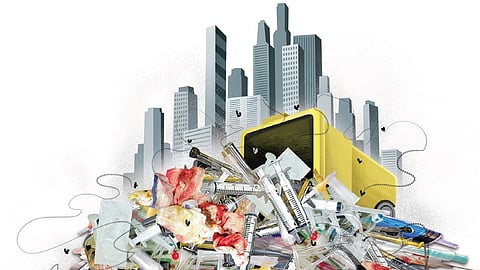

THIRUVANANTHAPURAM: Kerala is grappling with a medical-waste crisis as incidents of illegal dumping in neighbouring states become a major concern. The dumping of medical waste in Tamil Nadu has landed the state under the scanner of the National Green Tribunal (NGT), which has reiterated its call for urgent measures to address the critical issue.
According to sources, only 70 tonnes of medical waste generated daily in the state are being handled scientifically. And the fact that the health department and the state government have no clue as to the actual number of medical-waste generators is exacerbating the situation, they add.
Currently, Kerala Enviro Infrastructure Ltd (KEIL) and Indian Medical Association's Image are the two agencies in the state processing medical waste. According to the IMA, only 60% of the total medical waste generated in the state is being managed scientifically, as per rules and regulations stipulated under the Biomedical Waste Management Rules 2016.
The state requires more medical waste management facilities, Image chairman Dr Abraham Varghese pointed out. "As per rules mandated by the National Pollution Control Board (PCB) and state PCB, Kerala has only two accredited agencies for managing biomedical waste. And 30-40% of medical-waste generators are managing their refuse illegally through unauthorised service providers," Dr Abraham told TNIE. According to available information, only 28,000 establishments avail the services of KEIL and Image.
In an effort to ensure the scientific handling of medical waste, the state government, jointly with the IMA, has moved to set up another plant in Adoor with the capacity to treat around 15 tonnes of medical waste daily.
"The process for execution of the project has been completed, including public hearings. Owing to public resistance the government has put the project on hold. We just need the go-ahead from the government to implement the project," he said.
The state government and the health department have been accused of being in the dark about the actual generation of medical waste. LSGD Minister M B Rajesh said medical-waste management is a critical issue, which will be taken up at an upcoming meeting with the health department. "We will take urgent measures to address the crisis," Rajesh told TNIE. The minister added that premier institutions like the RCC can set up their own plants for managing waste.
Public resistance is becoming a major challenge for the state government in setting up waste management facilities. Chief secretary Sarada Muraleedharan said that there have been relentless efforts for the past many years to identify suitable locations for setting up these facilities.
"The proposed waste management projects were torpedoed by stiff public resistance. We have identified umpteen number of suitable locations but nobody wants the waste to be disposed in their own backyard. This attitude should change, so as to resolve our waste management crisis. We are forced to depend on other states because of this," she said.
Improper disposal
Biomedical waste generators include hospitals, nursing homes, clinics, dispensaries, veterinary hospitals and clinics, animal houses, pathological laboratories, blood banks, health care facilities, and clinical establishments
Only KEIL and IMAGE are the two accredited agencies eligible for managing medical waste
30 to 40% of the medical waste generators are managing their medical waste illegally through unauthorised service providers